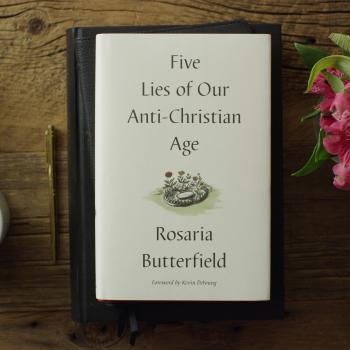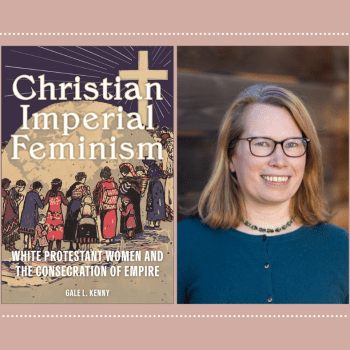- “Christian feminism” is an oxymoron.
…and “secular feminism” is a tautology.
Yes, there are certainly “secular feminists,” and there are some who are downright hostile to Christianity. But to consider Christianity and feminism as mutually exclusive obscures a long and vibrant history of Christian feminism.
There are countless examples of Christian teachings and practices that have oppressed and marginalized women. But you can also find remarkable examples of women and men inspired by their Christian faith to counter oppressive assumptions and practices: Puritans advocating for the education of women and girls; Christian women mobilizing to secure women’s right to vote; and, in the 1960s, several deeply religious women helping to found NOW, the National Organization for Women.

This isn’t the whole story, but it’s an important part of the story. Understanding the role that Christianity has played in awakening women and men to the need for women’s liberation challenges any notion that Christian feminism is simply the result of Christians being led astray by cultural accommodation.
- Feminism is only about abortion.
As someone raised in a conservative Christian subculture, I was surprised how unobjectionable may feminist causes actually seemed once I started to study the history of feminism. The right of married women to own property, to divorce abusive husbands, to retain custody of children, to vote, to be treated fairly in the workplace—these are “common-sense” rights I had taken for granted, but rights that exist thanks to feminism.
I was surprised to learn that the origins of “second-wave feminism” had far more to do with the rights of working-class women to receive good jobs and fair wages than with sexual liberation and abortion rights. Many lower-income women, women of color, and single women had long been part of the workforce, but they found few fulfilling jobs available to them, and they received low wages for their work. Many educated, middle-class women also wanted to work, but their options were limited: they could be a teacher or a secretary or a nurse. Before feminists forced change, job listings were segregated by sex. And it was perfectly legal for women to get paid less than men, to get fired for getting married, or pregnant, and to get sexually harassed on the job.
All of this isn’t to say that sexual liberation and abortion aren’t a part of modern feminism. But this history, too, is more complicated than you might think. At least until the mid-twentieth century, many feminists were against abortion; only gradually did they come to conclude that access to abortion was a key component of securing women’s rights. At the same time, many Christians, including many evangelicals, were actually “pro-choice” until the 1970s. Until then, it was often liberals who opposed abortion. Our present categories, then, are of surprisingly recent construction. And scratch beneath the surface and you can find many Christians who support abortion rights, feminists against abortion, and a burgeoning secular pro-life movement.
- Feminism provokes violence against women.
A number of years ago, women in my church were doing a book study. Paging through the book, I was surprised to read that feminists were to blame for the victimization of women. By pushing women into the workplace, so the story went, feminists opened women up to harassment and created a culture where women were objectified and subjected to abuse.
Reading this both surprised and grieved me, since I knew that feminists had long worked to protect and empower women. Nineteenth-century feminists (many of whom were Christians) rallied to the defense of prostitutes. They not only sought to “reform” and “rehabilitate” women whom many deemed irredeemable, but they also castigated a cultural double standard that punished women who failed to live up to unrealistic ideals of purity. They advocated for higher age-of-consent laws to protect young girls, worked to empower women to leave abusive marriages, and advocated for women’s custody rights in such cases.
“Second-wave” feminists have worked to protect women from rape, harassment, and abuse. They staffed rape crisis centers, worked to provide safe havens for victims of abuse, and fought for legislation to protect women and punish perpetrators. And they understood that violence against women wasn’t just a matter to be solved through legal efforts, but that a culture that fostered that violence needed to be addressed as well.
- Feminists hate men.
You can find a few outspoken feminists who have embraced a separatist women’s culture, and one that’s antagonistic to men, but not many. In fact, I’ve never actually met any personally.
Most feminists like men just fine. Many are married to them. Many feminists themselves are men.
Feminists do critique patriarchal power structures—structures in which men have been and remain complicit. But most feminists I’ve met believe that equality will improve life for women and men. Many are sensitive to the burdens unrealistic masculine ideals place on men, and are concerned about the challenges men and boys face in a time of economic uncertainty and cultural change.
- Feminists want to make women just like men.
Many feminists have tried to minimize perceived differences between women and men.
Many feminists have embraced difference.
In fact, nineteenth-century women’s rights activism thrived because women participated in a distinct “women’s culture,” and through shared experience found common cause with one another. In the 1820s, Sarah Grimke signed a letter to her sister in which she outlined a case for women’s rights with the words “thine in the bonds of womanhood.” This phrase is rich with double meaning: women were bound together, even as they were bound down.
In the twentieth century, there were different and at times conflicting impulses within feminism. Some liberal feminists sought equality, and to that end they fought against perceived “essential” differences—differences they understood to be socially constructed and therefore mutable. Other feminists, however, celebrated difference, and they sought to nurture a distinctive “woman’s culture” as part of their movement to empower women.
Rather than forcing women to be like men, or men to be like women (as critics of men’s “emasculation” would claim), most feminists want to open up a wider range of opportunities for women and men alike.
- Feminists are anti-motherhood.
Feminists don’t want women to be mothers, and they belittle women who choose to be “full-time” mothers, right?
I’m sure you can find a feminist here or there who fits this description, but they’re the exception, not the rule. In fact, feminists have long worked to empower women as mothers.
Although abortion and birth control might seem anti-motherhood, many feminists who advocate for reproductive rights also advocate for things like maternity leave and other forms of assistance to women and children.
I was surprised to learn, for example, that in the 1960s the National Organization for Women advocated for maternity leave and child care centers to assist women who wanted to be mothers and work outside the home, and they also advocated for national programs to retrain women who chose to stay home to care for their children if and when they decided to re-enter the work force. One proposal floated by feminists recommended that stay-at-home moms switch homes and pay each other for their labor so that women can earn wages and benefits. And many feminists have worked to validate caregiving, a task often devalued in our culture—an effort that benefits women and men who work in that capacity.
Most feminists want to both affirm women as mothers, but not limit women’s vocations and identities to motherhood. In short, they want to provide women with more options, and empower women in whichever option they choose.
- Feminists have no sense of humor.
I know a lot of feminists who are pretty funny, actually. But there’s some truth to this.
There are some things feminists don’t find funny: “joking” about rape or violence against women; belittling women, their abilities and their concerns; in short, making light of issues that have to do with dignity, respect, justice and equality.
Feminists tend to pay a lot of attention to power, and to how power is exercised, sometimes in ways we don’t even realize. Humor has often been used to “put women in their place” and to minimize their concerns. Feminists have often been objects of mockery, by men, by the media, and by other women. And so when humor is used in an attempt to disarm them or to distract from their cause, they probably won’t laugh.
- Feminists are ugly.
And they wear ugly skirts, combat boots, chopped hair, and no makeup.
In truth, feminists come in all kinds. (And remember, men can be feminists too.) But it’s true that many feminists have fought against conventional beauty standards. They’ve insisted that women shouldn’t be judged by their appearance and forced to spend time and money on a host of beauty products. They emphasize that women’s bodies are to be lived in and not, primarily, to be looked at.
What’s interesting to me as a historian of women and religion is how Christians used to agree with feminists on this. Many evangelical Christians, for example, used to chide women for vanity, for focusing on their appearance and for spending time and money on things that don’t ultimately matter. But in my research I noticed that in the 1920s and 1930s, and again in the 1960s and 70s, many Christians started to emphasize “feminine” appearance. In the 20s and 30s, a frilly femininity was set against images of flappers and the “modern woman”; in the 1960s, Christian women were criticized for appearing “frumpy,” and thereby hindering their Christian witness. Interestingly, that’s around the same time feminists started saying the opposite, critiquing the commodification of female beauty.
Today, Christian diet books abound, Christian women are urged to beautify themselves, and now their houses, too. Christian bloggers even claim that Christian women are prettier, and that the Bible instructs them to be beautiful. And while Christians might claim that inner beauty matters most, a woman’s outward appearance is seen as a sign of that inner beauty.
I wonder if it might not be time to entertain a Christian critique of beauty standards and feminine ideals, and in doing so find common ground with feminists who have long opposed the objectification of women and commodification of femininity.
OK, so there can definitely be some truth to this one. But there’s a reason feminists talk boldly about sex. Christians have traditionally valued modesty, in dress, speech, and thought. Many feminists, however, discovered that not talking about sexuality left women unable to challenge the structures and beliefs that caused real harm.
By refusing to place sex outside the bounds of respectable conversation, feminists asserted the legitimacy of addressing issues that affected women intimately, without embarrassment or shame. The book Our Bodies, Ourselves, published in 1970 (originally titled Women and Their Bodies), made clear that the personal was political, and that women, who had long been kept in ignorance of their own bodies, had a right to know about their bodies, and to speak about their bodies.
More recently, works like Eve Ensler’s play The Vagina Monologues have provoked audiences to confront their squeamishness when it comes to speaking of female bodies.
Christians who were raised to value modesty often cringe at this kind of rhetoric. But Christians may do well to consider what harm is done by a reluctance to speak of some things, and instead look to empower others (particularly potential victims of abuse) to speak of these things.
In fact, nineteenth century Christian women fought hard to break the “conspiracy of silence” Victorian modesty imposed upon women’s sexuality. They understood that silence made women vulnerable and robbed them of recourse in addressing violence done to them. There may be a lesson for us today.
- Feminists are…
As is the case with Christianity, feminism is a diverse and varied movement. Just as the entirety of Christianity can’t be summed up by pointing to either Mother Theresa or Jimmy Swaggart, so, too, should we be wary of characterizing feminism by its extremes.
We should also be critical of the characterizations (or caricatures) we come across. There are plenty of Christian groups that malign feminism, but the popular media, too, can be the source of caricature.
Christians often think that the “mainstream media” is liberal, and that Christians are depicted in a less-than-flattering light. But feminists, too, make that same claim about the corporate media. As Susan Douglas puts it, “If millions of women stopped and said, ‘Hey, I don’t think I need lipstick, Lestoil, Oil of Olay, Victoria’s Secret boulder holders, Diet Coke, L’Oreal or Ultra Slim-Fast anymore,’ that would lead to a serious advertising revenue shortfall.” So it’s in the media’s interest to depict feminism in an unflattering light, and instead promote “post-feminism”—the notion that women don’t need feminism anymore.
Does this mean that all forms of feminism are fully compatible with all forms of Christianity? Not at all. But by clearing away misconceptions we can begin to have genuine dialogue—a dialogue that may reveal more common ground than one might expect, and also sharpen and refine our understanding of differences that may persist. A dialogue that might be mutually beneficial, enabling Christians, feminists, and Christian feminists to better promote justice and contribute to human flourishing.

















